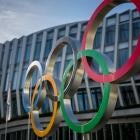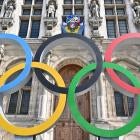
Russia will learn its fate on Tuesday for the 2018 Winter Olympics in Pyeongchang, South Korea. The executive board of the International Olympic Committe (IOC) is scheduled to meet in Switzerland on Tuesday, as reported by the Associated Press, and it will be voting on whether or not to ban Russia from the 2018 Winter Olympics altogether over its ongoing doping scandal.
Here's everything you need to know about the country's sticky situation -- and what's on tap as Olympics executives decide whether or not Russian athletes should even be allowed to compete this February.
How did we get here?
Russia was first targeted for a potential ban when the World Anti-Doping Agency (WADA) said in November that the country had been non-compliant in anti-doping standards. WADA's decision was an upholding of the original July 2016 decision which came after a separate July 2016 investigation by Richard McLaren -- more than 300 falsified drug test results within Russian Olympic programs that had International Olympic Committee (IOC) president Thomas Bach slamming the country for an "unprecedented attack on the integrity" of the Games. That inquiry found widespread doping schemes between Russian athletes and officials.
Russian officials have repeatedly denied the report's findings. To regain compliance, a 32-point plan was laid out for the RUSADA. Accoring to WADA, two of the 32 points were not met. Russia refused to acknowledge the existence of the program and would not provide access to a Moscow lab for WADA officials. Now, the decision is ultimately outside of WADA's hands, and rests on the International Olympic Committee.
Alexander Zhukov, president of the Russian Olympic Committee, called the WADA findings a "joke."
Since November, with only months to spare before the start of PyeongChang's 2018 ceremonies, Russia has seen more than two dozen athletes reprimanded by the IOC for cheating in previous Olympics, namely the 2014 Sochi Games. Some have been stripped of gold medals for their alleged roles in a "state-backed doping program." Others have been retroactively disqualified. And many have been outright and indefinitely banned from future Olympics participation, including in February's South Korean Winter Games.
All the while, Russian president Vladimir Putin has neither acknowledged nor publicly considered the possibility of state cooperation in the doping scandal despite incriminating notes from a Russian chemist that were obtained by The New York Times. He's been most vocal, in fact, when painting the widespread Olympics sanctions not as evidence of structural corruption in his own country but merely as fodder for his political rivals -- Putin is on record suggesting that America is using the doping sanctions to "discredit" his government and influence Russia's presidential election in March.
Wait, so Russia could really be withheld from the Olympics?
Yes. Countries have been getting banned from the Games for various reasons since 1920, and in case you forgot, Russia was without plenty of its athletes, including its entire weightlifting team, at the 2016 Summer Olympics in Rio after the IOC punished them for doping.
When will we find out if Russia is banned?
IOC president Thomas Bach is slated to announce the board's decision at 18:30 Greenwich Mean Time (1:30 p.m. Eastern) on Tuesday. But a final ruling on Russia's status could be delayed by an appeal to the international Court of Arbitration for Sport -- Russia appealed its 2016 Olympics sanctions and enabled some of their disqualified athletes to compete.
What happens if Russia is banned?
For one, Putin will be furious. Losing any and all connection to the Olympics a month before Russia's election would be a black mark for his country, and the IOC is reportedly already aware that its decision could humiliate the disgruntled president. The Olympics, however, would carry on as usual, albeit without any Russian competition and some mixed reviews as a result -- a former anti-doping whistleblower told BBC that a Russian ban would successfully expose state-wide injustices, while others are more concerned that a Russian absence could severely hinder Olympics sports, specifically ice hockey (remember that the NHL is already shortchanging the Winter Games this year).
What happens if Russia isn't banned?
This is a very real possibility. And there are several scenarios that could play out:
- Russian athletes could be forced to compete neutrally, meaning they wouldn't represent their country. As USA Today notes, this has been done before -- Kuwait endured such punishment in 2016, competing as "Independent Olympic Athletes."
- Russia could be forced to partake in the Games with neutral uniforms and zero use of any Russian emblems, anthems or symbols. As The New York Times reported, absent an outright ban, the IOC is "likely" to strip Russia of all its tangible representation at the Games, including the opening ceremonies.
- Russia could boycott the Olympics anyway. In what would essentially amount to reverse finger-pointing, Putin and Co. could turn their back to the Winter Games, especially if they are unable to represent Russia in the first place.
What does all of this mean for the 2018 Winter Olympics?
Well, it certainly doesn't look good. The Winter Games already have enough issues to confront, like fans having "very low" interest in traveling to PyeongChang because of tensions with neighboring North Korea. Banning Russia wouldn't exactly be a universal victory if it steals legitimate talent -- or a semblance of ice hockey competence, for example -- from the global stage, but hitting the country with a simple slap on the wrist wouldn't necessarily be the proper stand against cheating, either. Either way, the IOC has its hands full.





















